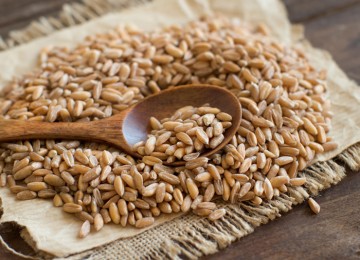Health Articles
A study from the Harvard School of Public Health has found that eating whole grains may help you live longer. Whole grains are one of the major foods that can help prevent chronic disease. This study, published this month in the journal JAMA Internal Medicine, further promotes the current dietary guidelines for whole grains.
Whole grains, such as brown rice, quinoa and whole oats, are known to have significant health benefits. According to WebMD, they are full of nutrients including protein, fiber, B vitamins, antioxidants, and various minerals. A whole grain diet can reduce the risk of heart disease, type 2 diabetes, obesity, some cancers, and may improve bowel health by helping to maintain regular bowel movements and promote growth of healthy bacteria in the colon. However, only 10% of Americans eat the daily recommendation of at least three servings a day.
Researchers looked at two large studies. One was the Nurses’ Health Study which looked at 74,000 women from 1984 and 2010 and the other was Health Professionals Follow-Up Study which looked at 44,000 men from 1986 to 2010. At beginning of study, all participants were healthy and did not have heart disease or cancer. The participants had regular exams and allowed the researchers to review their medical records. They also filled out questionnaires regarding age, smoking, body mass index, exercise and diet.
The results showed that people who ate at least 28 grams of whole grains a day had a 9 percent lower risk of dying from heart disease and a 5 percent lower risk of death from any cause, compared to people who ate little or no whole grains. People who replaced one daily serving of refined grains with whole grains reduced their risk of dying by 8 percent, and people who replaced one daily serving of red meat with whole grains reduced their risk of dying over by 20%. Eating more whole grains, however, did not did not reduce the risk of dying from cancer. Researchers claim this may be because the two studies did not have enough cases of specific types of cancer to show whether grains is helpful.
Taking into account the factors such as age, smoking, body mass index, exercise and diet were important because they can affect the risk of death. Interestingly enough, it just so happened that people who ate more whole grains exercised more frequently, ate a healthy diet in general, smoked less, and drank less alcohol, compared to people who ate little or no whole grains.
As for which part of the whole grain is responsible for the health benefit, researchers say bran had the largest effect on reducing risk of death from heart disease. Bran is the tough skin that covers the kernel of a whole grain. It is rich in antioxidants, vitamin B and fiber. When whole grain is processed into refined grain, the bran is removed.
Health benefits of whole grains.
- More nutritious than white bread and white rice
- Lower glycemic index
- More beneficial nutrients such as fiber, magnesium, vitamin E, and phytochemicals
- Helps the body regulate blood sugar, fats and cholesterol
- Keeps the blood vessels healthier
- Helps prevent DNA damage and reduces inflammation in the body
Best whole grain foods.
- Whole oats or oatmeal
- Whole grain bread, whole rye bread
- Whole grain pasta
- Whole wheat flour
- Brown rice, wild rice
- Quinoa
- Buckwheat
- Whole grain corn or corn meal
- Popcorn

